News
“A person arriving in BMW should not get an operation free at NHSL”
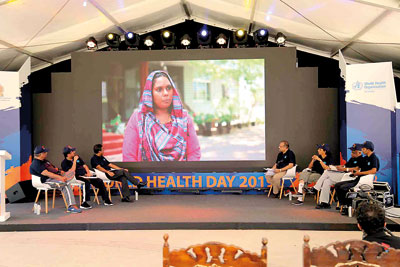
A ‘Voice from the field’ on video as the panellists prepare for the discussion. On the right (closest to the screen) are Dr. Ruvaiz Haniffa, Dr. Anula Wijesundara, Dr. Palitha Abeykoon and the Education Ministry’s N.P. Gunasekera. On the left (closest to the screen) are Dr. Harsha de Silva, Dr. Anil Jasinghe and State Minister Faizal Cassim
The woes of men, women and children who are facing numerous challenges even though the country has a vibrant ‘free’ state health system came forth loud and clear last Sunday.
Videos of ‘Voices from the field’ brought the reality of many unable to access health care, to the heart of Colombo city when World Health Day was celebrated on April 7 at the Independence Arcade in Colombo 7, with a drone flying around capturing images of the area. The theme was ‘Universal Health Coverage: Everyone Everywhere’.
This was while elsewhere people were having their eyes tested and others were visiting health-related stalls.
These “voices” from the field set the tone for an interactive panel discussion moderated by the Immediate Past President of the Sri Lanka Medical Association (SLMA), Dr. Ruvaiz Haniffa, with hard-hitting questions being directed to the relevant panellists.
A team from the World Health Organisation (WHO), the College of Community Physicians and provincial health authorities had journeyed the long road, more than 2,000 km, in the month leading up to World Health Day, collecting these “voices”.
From Nallur in Jaffna to Kebithigollewa in Anuradhapura, from Welimada in Badulla to Bibile in Moneragala, concluding their journey at Colombo 10, the team had spoken to more than a thousand people……asking them what they want from the health system. (See box for people’s views.)
Lamenting that when the new government took over in 2015, its total income was 11%, Economic Reforms (non-Cabinet) Minister Dr. Harsha de Silva explained that everything cannot be done with this.
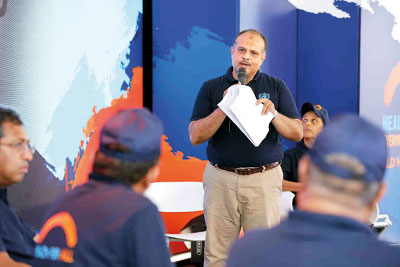
Dr. Ruvaiz Haniffa fielding questions
In response to the first question fielded by Dr. Haniffa as to what measures are hindering an increase in per capita government health expenditure in terms of GDP to at least 4-4.5%, Dr. de Silva said that the government just cannot do it – increase expenditure on health to 4% and on education to 6%.
Earlier, Dr. Haniffa had pointed out that the per capita government health expenditure as a percentage of the GDP in Sri Lanka is about 1.6%, which figure is comparatively low, while the Out-of-Pocket Expenditure (OOPE) on health as a percentage of health expenditure is around 50% in Sri Lanka, which figure is comparatively high.
Dr. de Silva said “okkama padui” (everything is at a loss) and what the country has to decide is whether certain things can be done or not. The country’s first priority is “naya geveema” (repaying loans).
Dealing with specifics, he said that the total income of the country is 11% and 90% of that goes to pay the loans the country has taken. “Little is left for anything else. With an increase in taxes, this year there was a rise in our income to 14%. But our No. 1 priority is repayment of our debts. Then there is nothing left. More than 100% of our 14% of government revenue goes as debt payment. Not five cents is left for education or health.”
We will need a 20-21% income to meet all the demands. How do we prioritize where to spend? But with all these challenges, health and education continue to be a priority for us, he said, asking the question: Should everyone get everything free?
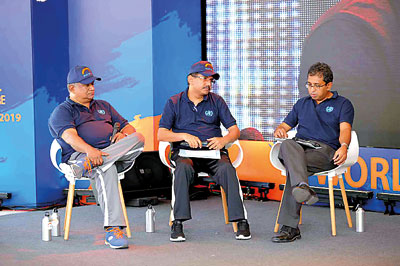
From the right Dr. Harsha de Silva, Dr. Anil Jasinghe and State Minister Faizal Cassim
Citing the example of not being able to have the cake and also eat it, Dr. de Silva said that even though the government must give everything to everyone, why should the person who comes in a BMW get an operation costing Rs. 1 million absolutely free at the National Hospital of Sri Lanka (NHSL)? How do we get the BMW guy to go to the private sector? You can’t mandate that – you should have a needs-based system. The higher the income of a person, the lower the subsidy should be, both in health and education.
But, he said, Sri Lanka is used to “welfare politics”. The people expect it. Here come the morals and ethics. Isn’t there a social responsibility on the part of the citizens too? Should influential people jump the queue and get their matters attended to?
“The government has not been able to implement a means-tested subsidy scheme where we give subsidies to the receiver directly and not the supplier. When it is given to the supplier, the rich people get it and sometimes the poor people don’t. Subsidies should be on a 0 (zero) to 100 (hundred) continuum,” said Dr. de Silva, stressing that Sri Lanka needs a policy shift and “we need the backbone” to do this.
The other panellists were the State Minister of Health, Faizal Cassim; the Director-General of Health Services, Dr. Anil Jasinghe; and an Education Ministry representative N.P. Gunasekera.
On the podium with Dr. Haniffa were SLMA President Dr. Anula Wijesundara and National Authority on Tobacco and Alcohol (NATA) President Dr. Palitha Abeykoon.
After the panel discussion, everyone moved to the ‘lion area’ of the arcade to form the Solidarity Chain as was being done across the world to show support for the need for Universal Health Coverage.
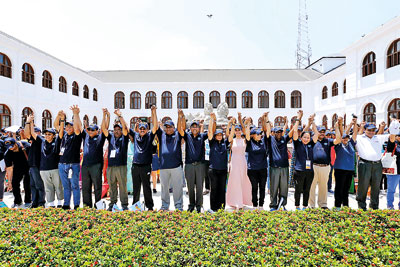
The Solidarity Chain
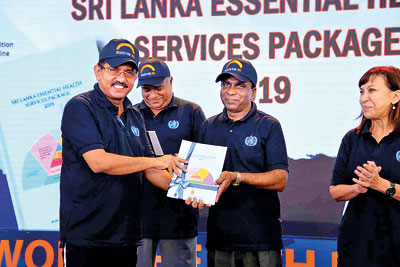
The launch of the Essential Services Package: from left are Health Services Director-General, Dr. Anil Jasinghe; State Minister of Health, Faizal Cassim; Acting Health Ministry Secretary, Nimal Balasooriya and UN Resident Coordinator Hanaa Singer
What the people focussed on
With three themes being taken up during the collection of ‘Voices from the field’, on the first ‘Health care access and concerns of human resources’, the people had focused on:
The distance to hospitals
Difficulty in accessing specialized care
Difficulty in getting to hospitals at night/off-peak hours – particularly due to distance and problems such as wild elephants being on the road after dark
Inability to access the full spectrum of care
Not having adequate staff – doctors, nurses and others
Continuity of care as the doctor turnover was high
Smaller hospitals not being managed well
On the second theme ‘Out-of-pocket payments for health’, they had said:
Considerable Out-Of-Pocket Expenses (OOPEs) when seeking healthcare
Not having services led patients to seek out city/large hospitals and mostly the large channelling centres and private hospitals in the city. These provide specialized care and other services at a cost.
Some medicines not being available at the smaller hospitals
The smallest hospitals (Primary Medical Care Units – PMCUs) not having laboratory services and Divisional Hospitals having limited capacity for investigations
Specialized investigations, surgeries and cancer care among the high spenders
People taking village loans at high interest to cover these costs
Some of them not taking treatment due to the cost
On the third theme ‘Health education and promotion including behaviour change’, they had said:
People are not “health” literate
Bad/adverse behaviours seen in society. These are making the people sick. It is obvious that lifestyle modifications are needed
There are so many economic determinants of health and many influences, including advertising and that of tobacco and alcohol
Art sessions
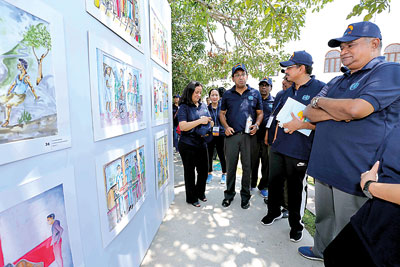
Admiring the children’s works of art – (from left) State Minister Faizal Cassim, Dr. Anil Jasinghe, Dr. Harsha de Silva and WHO Representative in Sri Lanka, Dr. Razia Pendse.
‘Universal Health Coverage: Everyone, Everywhere’ was also the theme of art sessions organized by the Western Provincial Director of Health Services, the College of Community Physicians of Sri Lanka and the WHO Sri Lanka.
More than 600 children from rural and remote schools in the Western Province participated in this art exhibition held under the three categories of Grades 1-5; Grades 6-10 and Grades 11-13. From among these entries, 50 were displayed as an ‘open exhibition’ which was inaugurated by State Health Minister Faizal Cassim and Economic Reforms Minister Dr. Harsha de Silva.
While the inauguration took place after the panel discussion, a live art session was also held on site.

